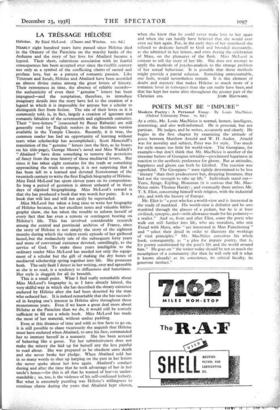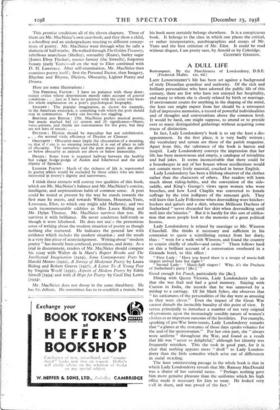POETS MUST BE " IMPURE "
As a critic, Mr. Louis MacNeice is normal, honest, intelligent, interesting, and also well-informed. He is personal, but not partisan. He judges, and he writes, accurately and clearly. He begins in the first chapter by examining the 'attitude of poets between Matthew Arnold and W. H. Auden. Arnold was for morality and subject, Pater was for style. Too much for style means too little for world-view. The Georgians, for example—but don't think that Mr. MacNeice is another of the tiresome baiters of Georgian triviality—proclaimed happiness in reaction to the aesthetic preference for gloom. But as attitudes, happiness and gloom can both be falsified. The reaction was superficial. The Georgians " were rightly determined to be less ' literary ' than their predecessors but, dropping literature, they had not the strength to take up life." Individuals stand out— Yeats, Synge, Kipling, Housman (it is curious that Mr. Mac- Neice omits Thomas Hardy) ; and eventually there arrives Mr. T. S. Eliot, concerning himself with religion, with the industrial city, and with the history of Europe.
Mr. Eliot is " a poet who has a world-view and is interested in the study of mankind. His world-view is defeatist and he sees mankind through the glasses of a pedant, but he is at least civilised, synoptic, and—with allowance made for his pedantry— a realist." And so, from and after Eliot, come the poets who walk out still further into life, who are moralists, who mix Freud with Marx, who " are interested in Man Functioning " and " select their detail in order to illustrate the workings of vital principles." Mr. MacNeice conceives his whole book, consequently, as " a plea for impure poetry, that is, for poetry conditioned by the poet's life and the world around him." He goes on " the writer today should be not so much the mouthpiece of a community (for then he will only tell it what it knows already) as its conscience, its critical faculty, its generous instinct." This premise conditions all of the eleven chapters. Three of them are Mr. MacNeice's own case-book, and they show a child, a schoolboy and an undergraduate reacting to different concep- tions of poetry. Mr. MacNeice went through what he calls a dialectic of half-truths. He walked through The Golden Treasury, rebellious anarchism (Shelley), sensuality (Keats), barley sugar
(James Elroy Flecker), rococo fantasy (the Sitwells), forgotten beauty .(Early Yeats)—all on the way to Eliot combined with
D. H. Lawrence. After self-examination, Mr. MacNeice then examines poetry itself ; first the Personal Factor, then Imagery, Rhythm and Rhyme, Diction, Obscurity, Lighter Poetry and Drama.
Here are some illustrations :
THE PERSONAL FACTOR : I have no patience with those deter- minist critics whose determinism merely takes account of general conditions . . . just as I have no patience with the critic who bases his whole explanation on a poet's psychological biography.
IMAGERY : The popular imagination, as shown' for example, in the American wisecrack, is something with which the poet should stay in communion. Poetry can become too niggling.
RHYTHM AND RHYME : [Mr. MacNeice prefers musical poetry, but music marked by] (a) system and (b) significance—Metre, verse-pattern, and rhyme are conveniences for the poet, but they are not laws of nature. . . .
DicrioN Diction should be masculine but not exhibitionist. . . . the normal virile efficiency of Dryden or Chaucer.
OBscuarry : Obscurity must imply the obscuration of a meaning, so that if flere is no meaning intended, it is out of place to talk of obscurity. The surrealists and the pure music poets are above or below obscurity as animals are above or below immorality.
DRAMA: Some form is required halfway between the healthy but vulgar hodge-podge of Auden and Isherwood and the arid dignity of Spender.
LIGHTER POETRY : Much of the richness of life is represented in poetry ,which would be excluded by those critics who are more interested in poetry's dignity and narrowness.
I think .these extracts will convey two qualities of this book,
which are Mr. MacNeice's balance and Mr. MacNeice's concise, intelligent, and unpretentious habit of common sense. A poet could -be tested at present by the way he stands towards the
first man he meets, and towards Whitman, Housman, Yeats, Lawrence, Eliot, to which one might add Mallarme, and two such incommensurable oddities as Miss Laura Riding and Mr. Dylan Thomas. Mr. MacNeice survives that test. He survives it with brilliance. He never condemns half-truth as though it were falsehood. He does not ma:_.: the pretentious error of writing about the modem situation of poetry as though nothing else mattered. He indicates the general law with evidence which includes the modern situation ; and the result is a very fine piece of acute judgement. Writing about "modern poetry " has mostly been confused, pretentious, and dotty. As a trial in discernment, readers of Mr. MacNeice should compare his essay with Walter de la Mare's Rupert Brooke and The Intellectual Imagination (1919), Some Contemporary Poets by Harold Monro (192o), A Survey of Modernist Poetry by Laura Riding and Robert Graves (1927), A Letter To A Young Poet by Virginia Woolf (1932), Aspects of Modern Poetry by Edith Sitwell (1934) and with A Hope for Poetry by Cecil Day Lewis
(1934).
Mr. MacNeice does not droop in the same shrubbery. He has his defects. He sometimes has to re-establish a truism, but his book most certainly belongs elsewhere. It is a conspicuous book. It belongs to the class in which one places the critical, or rather interpretative, autobiographies and essays of Mr. Yeats and the best criticism of Mr. Eliot. It could be read without disgust, I am pretty sure, by Arnold or by Coleridge.
GEOFFREY GRIGSON.



































 Previous page
Previous page